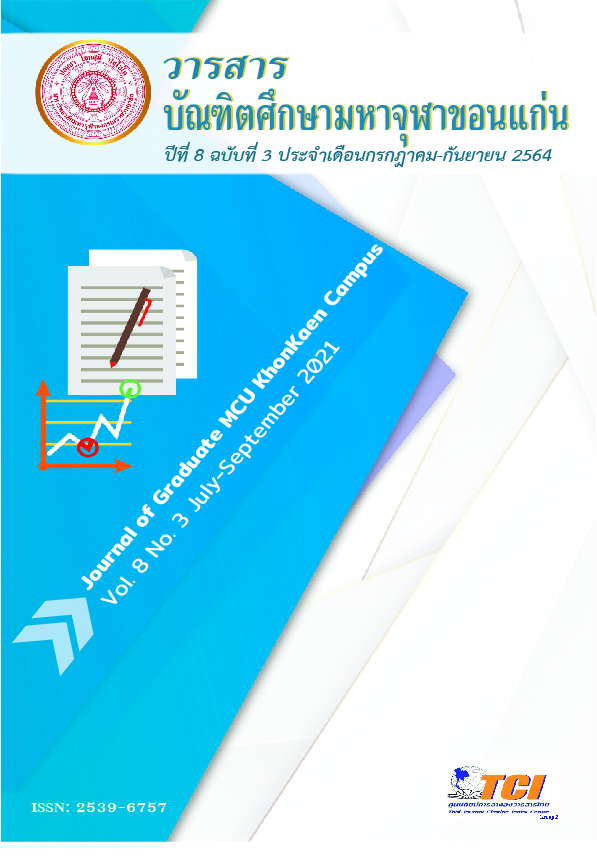BUDDHIST COMMUNITY BUILDING PROCESS
Main Article Content
Abstract
This research has the following objectives: 1) to analyze the principles of community relations development in accordance with the principles of Dhamma in Buddhism, 2) to analyze the strategies of community relations practices in the Buddhist way, and 3) to analyze public participation and the creation of community networks. Buddhist relationship.
Principles of community relations development according to the Dhamma principles in Buddhism. The result of the research shows that the principles that contribute to the development of community relations activities are: 1) Sangahavatthu 4 is the Dhamma principle that promotes unity among faculties and society. Supporting each other To be friendly and to create affection Good connections of people in the community, consisting of (1) giving, helping, supporting others (2) speaking well and with benefits Create unity to the group. (3) Behave for the benefit of the public / others. (4) Consistently behave themselves. 2) The influence of Baht 4 is the dharma of success. Or the Dharma which is the reason for success is satisfaction (chanting), perseverance (persistence), attention (chitta) and thoughtfulness (discretion). Composed of love Good wishes (compassion), compassion, compassion for others (please), joy for the success of others (Muthita) and neutral trust. Understand by reason (equanimity) is an important principle for leaders or guardians that should have in themselves and apply in the development of community and society. 4) Prayer 4 is the development training. Body training To be aware of all external things in a way that is beneficial, correct, and good. (2) Siwan Pray, training, behavior development to be in discipline To live together with others with each other. (3) mental prayer training to develop a strong, cheerful, cheerful. (4) Wisdom prayer. Training to develop wisdom to know and understand all things as true. Able to live life with accuracy. 5) Physical Education 5 principles that promote community and society to be strong, consisting of (1) confidence in the development of work successfully (2) order and order of the community. And society. (3) Wiriya is determined to accomplish the task as intended. (4) Concentration, stability, (5) Intelligence, ability to consider Consider before deciding to do such a thing. 6) Apostolic philosophy is that Dhamma is the location of perpetuity. It consists of being in unison, ending the meeting, and doing the work that should be done. Resulting in unity among the group, following the rules and obeying the elders Behavior Enables each other to govern, able to withstand temptation or seduction And do not make mistakes that will cause loss of work And setting good wishes for those who work with them Generous to colleagues Do not envy others
Strategies for community relations performance The results of the research showed that Is to build relationships among people in the community Create development activities in accordance with the way of life of people in the community By participation and joint ownership of people in the community By bringing the principles of Buddhism integrated with beliefs, culture, traditions and community life Based on the analysis of the needs and potential of the community Proceeded as a mutual agreement Strategic guidelines There are steps to be taken: 1) Community to set directions 2) Create participatory development activities 3) Set goals 4) Have mutual agreement The community relations practice in the Buddhist way will enable the community to have potential, morality and ethics, leading to a knowledge-based society. Causing people in the community to have social immunity Have reconciliation and peace The goal is to make the community managed by people in every area of the community, resulting in discipline. Have generosity Have a democratic mind Respect the opinions and rights of others. Having volunteer spirit to make a contribution to participation
Participation and networking of Buddhist community relations The results of the research showed that Is carried out through participatory activities of people in the community The results of the research showed that Chang Phuak Subdistrict Suvarnabhumi District And Pho Thong Subdistrict Phon Thong District, Roi Et Province Operate in the form of community cooperation in participating in development activities that arise from the joint determination of people in the community. And implementing the objectives with the goal of being a Buddhist community That caused peace Is a free society Be safe in life and property. Have established a community forest volunteer group Reforestation youth seedling group As for network operation, it was found that there are 2 characteristics which are network in the area Is a collaboration with the municipality school, community health promotion hospital And the outside area network It is an agreement to support the exchange of learning with off-network networks
Article Details
References
ไชยรัตน์ เจริญสินโอฬาร. (2540). ขบวนการเคลื่อนไหวทางสังคมรูปแบบใหม่. ศูนย์วิจัยและ ผลิตตำรา: มหาวิทยาลัยเกริก.
ทนงศักดิ์ คุ้มไข่น้ำ. (2534). การพัฒนาเชิงปฏิบัติ. กรุงเทพมหานคร: บพิธการพิมพ์.
ประเวศ วะสี. (2541). ยุทธศาสตร์ชาติเพือความเข้มแข็งทางเศรษฐกิจ สังคม และศีลธรรม. กรุงเทพมหานคร: หมอชาวบ้าน.
พิทยา ว่องกุล. (2539). แนวคิดฝ่าวิกฤตทุนนิยมไร้พรมแดน เศรษฐธรรมและอธิปไตย
ชุมชนไทย. กรุงเทพมหานคร: บริษัท อมรินทร์ พริ้นติ้ง แอนด์ พับลิชชิ่ง จำกัด (มหาชน).
ไชยรัตน์ เจริญสินโอฬาร. (2543). วาทกรรมการพัฒนา: อำนาจ ความรู้ ความจริง เอกลักษณ์ และความเป็นอื่น, (พิมพ์ครั้งที่ 3). กรุงเทพมหานคร: สำนักพิมพ์วิภาษา.
ไพบูลย์ เจริญทรัพย์. (2534). การส่งเสริมและการพัฒนาการมีส่วนร่วมของชุมชน. กรุงเทพมหานคร: บริษัท นวกนก จำกัด.
เสรี พงศ์พิศ และคณะ. (2531). ทิศทางหมู่บ้านไทย. กรุงเทพมหานคร: สำนักพิมพ์หมู่บ้าน.
สัญญา สัญญาวิวัฒน์. (2525). การพัฒนาชุมชน. (พิมพ์ครั้งที่ 2). กรุงเทพมหานคร: ไทยวัฒนา พานิช.

